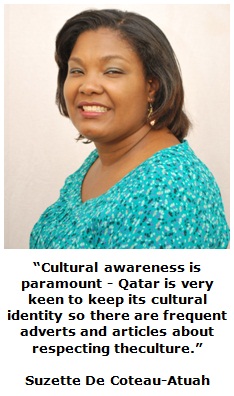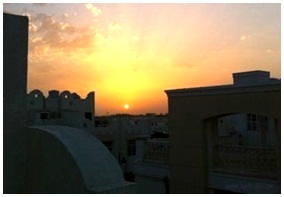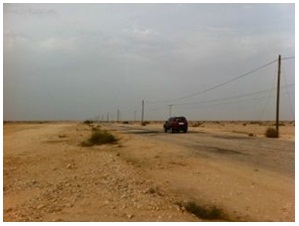 ReConnect Africa is a unique website and online magazine for the African professional in the Diaspora. Packed with
essential information about careers, business and jobs, ReConnect Africa keeps you connected to the best of Africa.
ReConnect Africa is a unique website and online magazine for the African professional in the Diaspora. Packed with
essential information about careers, business and jobs, ReConnect Africa keeps you connected to the best of Africa.



 Professionals of African and Caribbean heritage are today pursuing successful careers around the world, bringing their unique blend of skills and culture to the organisations that they support.
Professionals of African and Caribbean heritage are today pursuing successful careers around the world, bringing their unique blend of skills and culture to the organisations that they support.
ReConnect Africa (RCA): Please tell us about your background.
Suzette De Coteau-Atuah: I was born in Trinidad and Tobago and came to the UK in 1990 when I was 16. I read Business and French at Aston University.
Upon graduation, I volunteered and then worked for a charity called Hackney Caribbean Elderly Organisation. This motivated me to work in the public sector, so I applied to and was successful in obtaining a place on the National Health Service Management Training Scheme (MTS). MTS is a 2-year internship, during which time I worked in different health organizations, and even managed to have a 3 month stint in Ghana with the Catholic Health Service of Kumasi.
I completed the scheme in 2000 and between then and 2010, I self-promoted by changing jobs within the NHS - on average every 18 months. My roles were all fundamentally about change and quality.
Within that broad remit, I contract managed Mental Health and Community services; developed business plans for District Nursing, Health Visiting and School Nursing; commissioned diversity training for a Primary Care Organisation and established a salaried GP practice.
Since 2010, I have worked as a Project Manager in an internal change management/improvement team for Hamad Medical Corporation which provides public healthcare in the State of Qatar. Currently the corporation is responsible for 8 hospitals.
During my time here, I’ve helped implement a fixed time appointment system which included the development of a referral form, establishing a referral management office and patient contact and booking center, developing of communication and education materials and training of front line staff.
I am currently working on a project on assessing all patients for deep vein thrombo-embolism or pulmonary embolism risk, once admitted to a ward in any of our hospitals.
RCA: You made your first international move from the Caribbean to work in the UK. What was behind that decision?
Suzette De Coteau-Atuah: The move from the Caribbean was motivated by my mother. Our economy is based on petroleum and as oil prices took a dive in the late eighties, the cost of living headed in the opposite direction.
The government of Trinidad and Tobago steadily increased the cost of tuition at university and my dream of being the first of the family to have a tertiary education became more and more distant. Consequently my mother persuaded my step-dad that a move to the UK would be best for our education. They are primary school teachers and, as serendipity would have it, the London Borough of Hackney, under the auspices of Gus John, was recruiting in our twin-island nation.
I was not as convinced because several relatives and friends had moved or were moving to the US, and I did not even know back in 1989 that there were black people in the UK! I was negotiating to stay in Trinidad up to the day before our departure. However, I have long since ‘forgiven’ my mum, and thanked her for her vision and courage.
 RCA: What inspired you to consider working in Qatar?
RCA: What inspired you to consider working in Qatar?
Suzette De Coteau-Atuah: The weather! I am one of those people who get depressed in cold weather and tried to go back to the Caribbean for Christmas or Carnival as much as I could. So the idea of round-the-year sunshine appealed.
Additionally, working in the UK NHS as a contractor in a management post had become high risk. Then I saw the ad for my current role in the Health Service Journal. I have been blessed to get about 5% of the jobs I have applied for so my husband Kofi and I spent a weekend discussing the pros and cons of moving to Qatar and e-mailing our friends in Bahrain, before I decided to send in my CV.
RCA: What kind of research did you do before you decided that this was a country you could work in effectively?
Suzette De Coteau-Atuah: Luckily, at that time, a friend of ours had worked in Qatar and Bahrain since 2003. She’s British, of Nigerian extraction, and had worked for the same organization I was applying to. She encouraged me to:
RCA: What were some of your immediate challenges when you started work?
Suzette De Coteau-Atuah: I was put in temporary accommodation and told I’d be there for 2 months when the recruiter had said 2 weeks. In the end we were in temporary housing for 6 months and our belongings were in storage and costing us a lot of money.
Here, the company that employs you sponsors you, which means that I could not leave the country without getting an exit permit i.e. I had to complete a form asking permission, which then had to be approved and signed by my manager.
I was also told I could then sponsor my husband, which I have been unable to do and which meant he has unable to have a resident permit with all the attendant benefits. I was told that if I wanted to go on holiday during the first 10 months of my service it would be unpaid, and that weekends were counted in your annual leave allowance.
RCA: How important a role do you think cultural awareness plays and how do you remain sensitive to the different cultural norms?
Suzette De Coteau-Atuah: Cultural awareness is paramount. The call to prayer punctuates all life, including the radio, five times a day, so there is no forgetting that you are in an Islamic country. Knowing and understanding about Islam is essential to not cause insult and is seen as a compliment.
Qatar is very keen to keep its cultural identity so there are frequent adverts and articles about respecting the culture around conservative dress, mixed gender gatherings, offensive behavior and language. So when I go out, I always cover my shoulders, generally preferring to wear tops that reach to my elbows, and I only wear shorts to the beach. In public, I neither kiss my husband nor hug my male friends. The driving can be crazy here, but it is essential that I don’t make any gestures that could be taken the wrong way.
It is very important to recognize that some aspects of life here is about culture rather than religion, and so one must not make generalizations or assumptions. At our church, there is a service in Arabic because, of course, there are Arabic Christians who come from Jordan and Lebanon, for example. There are also services in several Indian languages.
Coming from a secular country such as the UK, the central role of faith and its practice here can be quite a shock. Yet I find it easier to state that I am a Christian here, as there is respect for my having a belief.
RCA: What do you consider the benefits of living and working in Qatar?
Suzette De Coteau-Atuah: The pace of work is more relaxed. Things take longer to get done, but people take time to form relationships. Once you have earned someone’s trust and respect, you’re like family.
 Working with people from many different nationalities, for many of whom English may be their 4th or 5th language, encourages you to listen carefully, check understanding often and express yourself simply and clearly. For example, phrases such as ‘a week on Sunday’, ‘fortnightly’ and ‘half-past the hour’ stump even the Americans and Canadians!
Working with people from many different nationalities, for many of whom English may be their 4th or 5th language, encourages you to listen carefully, check understanding often and express yourself simply and clearly. For example, phrases such as ‘a week on Sunday’, ‘fortnightly’ and ‘half-past the hour’ stump even the Americans and Canadians!
Did I mention the sunshine? However, some months of the year the temperature does reach 45–50 degrees Celsius, and the humidity gets so high that being outside is unbearable and could be life threatening.
I work from 7 am to 3pm and my commute is 15-20 minutes, so there is more time between end of work and bed time, which means I have time to be a mother and take time for me: developing my writing and socializing. We live in an enclosed compound with a communal space and a swimming pool and we can go to the beach every weekend.
RCA: What has having a global career taught you about yourself?
Suzette De Coteau-Atuah: That I am adaptable; to trust my gut instincts, to be clear about why I am here, and to revisit and re-clarify the reasons regularly.
